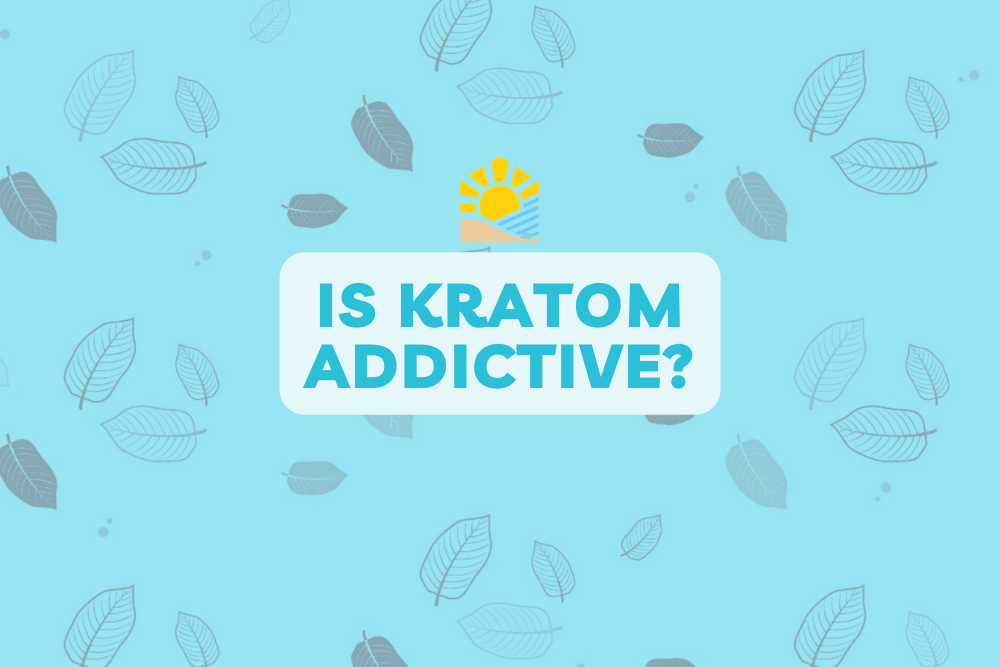Read the latest and greatest from our team
of incredible specialists.

Beach House Recovery Center » Blog » Is Kratom Addictive? Here’s What to Know
Kratom, a plant-based substance gaining popularity as a purported pain reliever and energy booster, is raising serious concerns about addiction. Despite its natural origins and over-the-counter availability, Kratom has demonstrated addictive properties and poses significant health risks.
While touted as a harmless herbal remedy, Kratom has come under scrutiny from health officials. Its classification as a “drug of concern” by the DEA underscores the potential dangers associated with its use. In this blog post, we delve into the addictive nature, exploring the evidence supporting its harmful effects and the risks involved.
To learn more about Kratom, contact us directly or continue reading.

Kratom, a tropical tree native to Southeast Asia, has gained notoriety as a purported pain reliever and energy booster. Its leaves are often processed into powders, capsules, or extracts and consumed in various ways. Despite its growing popularity, Kratom poses significant health risks, including addiction.
While marketed as a natural alternative to prescription medications, Kratom’s effects can vary widely depending on the dosage. In lower amounts, it can act as a stimulant, while higher doses produce sedative effects. This unpredictable nature, coupled with its potential for abuse and dependence, has raised alarms among health professionals.
Despite its dangers, Kratom remains legal in many parts of the United States. However, it’s essential to understand that the long-term consequences of Kratom use are still being studied. As research continues, it’s becoming increasingly clear that this substance is far from harmless.
Kratom is not approved by the FDA. There aren’t enough rigorous scientific studies to justify its use as a treatment for fatigue, opium withdrawal, or other recognizable medical conditions.
However, experts do recognize the potentially harmful side effects of Kratom, such as:
The DEA has listed this substance as a “drug and chemical of concern,” and other organizations have declared that Kratom is addictive. The compounds in this substance act on the same receptors in the brain as other drugs known to cause addiction. Some studies indicate that people who stop taking it have withdrawal symptoms.
The Diagnostic and Statistical Manual of Mental Disorders (DSM-5-TR) helps healthcare professionals diagnose substance use disorders. Kratom use is not currently listed, but this could change as researchers dig deeper into its use and effects.
If people continue to take this drug even after recognizing its negative consequences, they should seek treatment. That is a sign of a substance use disorder.
Not everyone experiences the same effects of addiction, but there are several telltale signs to watch for.
Discontinuing Kratom use can lead to a range of debilitating withdrawal symptoms mirroring those associated with opioid addiction. Physical manifestations may include severe abdominal pain, intense hot flashes, muscle aches, and vomiting. In severe cases, seizures can occur.
Beyond the physical toll, Kratom withdrawal also impacts mental well-being. Individuals may experience irritability, anxiety, depression, agitation, and mood swings.
It’s crucial for those struggling with Kratom withdrawal to seek professional help. Specialized treatment programs can provide the necessary support and guidance to overcome addiction and reclaim their lives.
Living with chronic pain or the challenges of addiction can be overwhelming. While Kratom may seem like a quick fix, the risks far outweigh the potential benefits. It’s essential to seek professional guidance and explore healthier alternatives for managing pain or improving mood.
If you or someone you care about is struggling with Kratom addiction, know that help is available. Beach House offers a compassionate and evidence-based approach to recovery. Our dedicated team provides personalized treatment plans to address the unique needs of each individual.
Don’t let Kratom control your life any longer. Take the first step toward healing and recovery. Contact us today to learn more about our programs and begin your journey to a healthier, happier you.
Whether you’re researching for yourself or a loved one, Beach House can help. We understand that this is a serious time in your life and that the treatment center you choose matters. We want you to feel comfortable and empowered to make the right decision for yourself, a friend, or a family member. This is why a counselor is waiting and available to answer your questions and help put your mind at ease regarding the next steps. Many of the staff at Beach House have walked in your shoes. If you feel you’re ready or want more information about how to help a loved one, we can help today. You can also learn why we are voted the #1 rehab for addiction treatment in Florida.
We accept most major insurance plans and can verify your benefits quickly and confidentially.
We’re committed to helping you access the care you need, our admissions counselors can guide you through your coverage options and available resources.





"*" indicates required fields